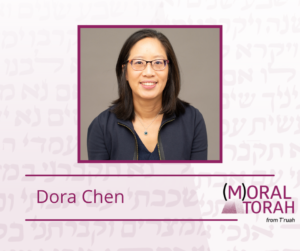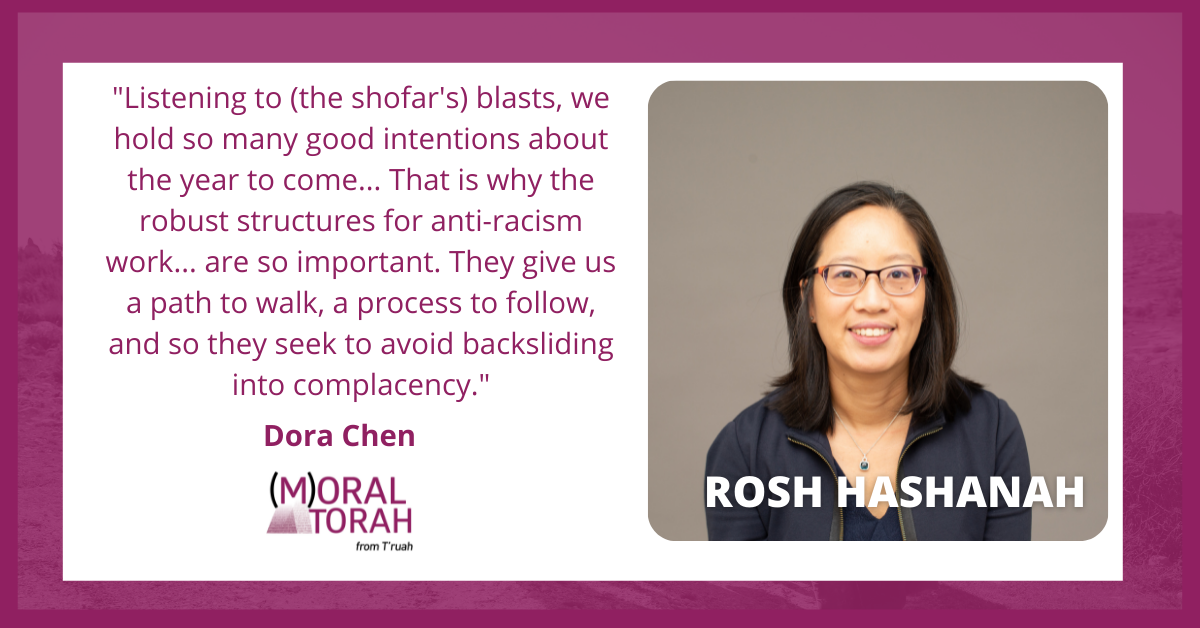A D’var Torah for Rosh Hashanah and Labor Day by Dora Chen
This year, Rosh Hashanah coincides with Labor Day. As a Jew of Color who also works as a union-side labor lawyer, this connection provides me with an opportunity to reflect on how, this Rosh Hashanah, we can re-commit to the fight against white supremacy and to dismantling structural racism in all of its forms.
Earlier this summer, the New York Times reported that support among white Americans for the Black Lives Matter movement has dropped from its all-time high immediately following the killing of George Floyd. White support for the movement has actually declined to levels that existed before the killings of Breona Taylor, George Floyd, and Ahmaud Arbery. This was especially disheartening to read after many of us thought the racial justice protests of the summer of 2020 would have a lasting impact. Not only is achieving racial equity in itself a goal, but, as Heather McGhee has written, racism has “hidden costs” for white Americans too. This zero-sum thinking explains why we have not been able to achieve progressive policies that would have benefitted white working-class Americans as well as workers of color, ranging from raising the minimum wage to expanded healthcare coverage.
Sign up to receive (M)oral Torah in your inbox each week.
So, what would a long-term commitment to achieving racial equity look like? My experience with two important civic institutions — unions and temples — has been instructive. My union, the two-million member Service Employees International Union, was founded in 1921 as a multiracial union led by people of color and immigrants. Our members work in the service and care sectors of the economy as janitors, airport wheelchair attendants, healthcare workers, child care providers, and county and city workers, many of whom continued to work as front-line essential workers during the COVID pandemic. In 2016, at our union’s convention, our members affirmed as a fundamental principle that, in order to win economic justice for all working people, we must address systemic racism and tackle the legacy of slavery and segregation head-on. That is why SEIU has prioritized the passage of President Biden’s Build Back Better Care plan, which would invest an unprecedented $400 billion in the care economy and its predominantly women-of-color workforce — a workforce largely excluded from the National Labor Relations Act to win its passage during the New Deal.
But it’s not enough for SEIU to center racial equity in our organizing and legislative campaigns without also “living our values” inside our own organization. For that reason, SEIU has been engaged in a robust process to become an anti-racist organization with regard to its own staff and internal policies and practices. This process began with our elected leadership several years ago. Our vision is that true equity would include: power-sharing for staff of color, cross-racial solidarity between different groups, and working beyond allyship so that all staff members — including white staff — understand and own their stake in challenging racism and changing existing practices. By engaging in this transformational process, we will be a stronger union that will be able to fight even more effectively on behalf of our members and working people.
Find more commentaries on Rosh Hashanah.
At my synagogue, Temple Sinai in Washington, DC, we have embarked on a similar effort through Multiracial Sinai, a standing committee whose explicit purpose is help the temple become an affirmatively anti-racist congregation. While Temple Sinai has a well-deserved reputation as a leader in social justice work, we also recognized that we had work to do inside our own congregation, particularly with regard to the experience of Jews and People of Color. (Temple Sinai is certainly not alone, as reflected in the recently-published study by the Jews of Color Initiative, which catalogued the experiences of Jews of Color in predominantly white Jewish spaces.) As part of our efforts, over 100 members of our congregation, including the entire clergy team and senior staff, have engaged in our Building Racial Stamina six-week discussion group developed by my fellow Temple Sinai board member Deitra Reiser, which challenges white Jews to reflect on their own racial identity, increase awareness of the historic impact of racism inside Judaism as well as in our broader society, and increase their “racial stamina” in talking about race. Multiracial Sinai is also actively engaged in our Racial Equity Project, in which committee members are working with the temple’s clergy and lay leadership to review all aspects of the temple’s practices and programs with a racial equity lens.
On Rosh Hashanah, the shofar calls us to awaken, to refocus our attention from all the distractions that are a part of everyday life.  Listening to its blasts, we hold so many good intentions about the year to come. But that moment is fleeting. We know — and the New York Times survey confirms this — how distractible we are. That is why the robust structures for anti-racism work that SEIU and Temple Sinai are creating are so important. They give us a path to walk, a process to follow, and so they seek to avoid backsliding into complacency. We know that undoing the centuries of slavery and entrenched racial discrimination will not be completed in a year. We are living by the directive from Pirkei Avot: “You are not obligated to complete the work, but neither are you free to desist from it.”
Listening to its blasts, we hold so many good intentions about the year to come. But that moment is fleeting. We know — and the New York Times survey confirms this — how distractible we are. That is why the robust structures for anti-racism work that SEIU and Temple Sinai are creating are so important. They give us a path to walk, a process to follow, and so they seek to avoid backsliding into complacency. We know that undoing the centuries of slavery and entrenched racial discrimination will not be completed in a year. We are living by the directive from Pirkei Avot: “You are not obligated to complete the work, but neither are you free to desist from it.”
Dora Chen is an Associate General Counsel at the Service Employees International Union, where she is Counsel to SEIU’s Political Programs. She also serves on the Board of Trustees at Temple Sinai in Washington, DC.

